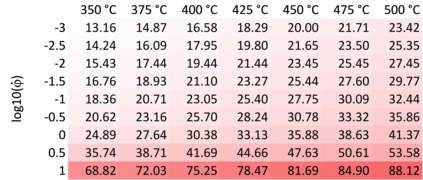In material science, models are derived to describe emergent properties (e.g. elasticity, strength, conductivity, ...) and their relations to the material and processing conditions. Constitutive models are models that describe the behaviour of materials for instance deformation processes through applied forces. We describe a general method for the extension of constitutive white-box models using genetic programming (GP). The method is demonstrated for a constitutive model which is used in computational mechanics to describe the material response to various thermo-mechanical loading conditions. This model operates with internal material variables such a dislocation density and contains a number of parameters. Among them there are three calibration parameters, which are usually fit to measured data since the relations to the processing conditions (e.g. deformation temperature, strain rate) are not fully understood. Our proposed GP-based method identifies these relations and generates short expressions which can be plugged into the constitutive model instead of the calibration parameters. This would enable interpolation as well as extrapolation which is crucial for constitutive modelling. Our results show that evolving extensions for the constitutive model implicitly with GP leads to better predictive accuracy than explicitly learning independent formulas for predicting calibration parameters with symbolic regression.
翻译:在材料科学中,模型用于描述突发特性(例如弹性、强度、导电率、......)及其与材料和加工条件的关系。组成模型是描述材料行为(例如通过应用力变形过程)的模型。我们描述的是利用基因编程(GP)扩展组成白箱模型的一般方法。该方法用于计算机中用来描述对各种热机械装载条件的物质反应的构成模型。该模型与内部物质变数如扰动密度和若干参数运作。其中有三个校准参数通常适合测量数据,因为与加工条件(例如变形温度、压力率)的关系不完全理解。我们提议的基于GP的方法确定了这些关系,并产生了可以插入成构件模型而不是校准参数的简短表达方式。这将使内推和外推成为构成模型的关键。我们的结果显示,与GPA相关的成型模型不断演变的扩展,隐含着GPGP的精确度,导致更好的预测性校准,而不是明确学习独立的公式的精确度。
相关内容
- Today (iOS and OS X): widgets for the Today view of Notification Center
- Share (iOS and OS X): post content to web services or share content with others
- Actions (iOS and OS X): app extensions to view or manipulate inside another app
- Photo Editing (iOS): edit a photo or video in Apple's Photos app with extensions from a third-party apps
- Finder Sync (OS X): remote file storage in the Finder with support for Finder content annotation
- Storage Provider (iOS): an interface between files inside an app and other apps on a user's device
- Custom Keyboard (iOS): system-wide alternative keyboards
Source: iOS 8 Extensions: Apple’s Plan for a Powerful App Ecosystem










